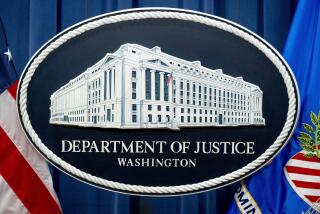Samsung chief’s office is raided
- Share via
SEOUL — Special prosecutors investigating corruption allegations at massive conglomerate Samsung Group raided an office of Chairman and Chief Executive Lee Kun-hee on Monday as part of a probe reluctantly approved last year by South Korea’s president, an official said.
Government investigators also raided the company’s headquarters in Seoul today, said Yim Jun-seok, a Samsung spokesman. He said investigators entered the strategic planning office.
Kang Dong-ju, an official with the team carrying out the probe, would say only that a total of eight locations associated with Samsung Group executives were raided. South Korean media said Lee’s home was part of the sweep, though Kang mentioned only an office.
Lee, who late last year marked 20 years at the helm of Samsung, is widely reported to work mostly from his residence. Photos and television footage showed what appeared to be prosecutors entering and later leaving his hilltop Seoul home.
Yim Jun-seok, a Samsung spokesman, said he could not confirm the raids.
Samsung, a conglomerate spanning dozens of companies including interests in construction and shipbuilding, is anchored by Samsung Electronics Co., South Korea’s biggest corporation.
Lee, an iconic business figure in South Korea and a member of the International Olympic Committee, is widely credited over the last decade and a half with turning Samsung Electronics into a global technology force through an emphasis on quality.
The company is the world’s largest manufacturer of computer memory chips and plays a leading global role in a range of electronics products including flat-screen televisions. It ranks No. 2 in the mobile phone market, behind Finland’s Nokia Corp.
Investors were mostly unfazed by the raids, pushing shares of Samsung Electronics 1.7% higher, though stock prices of some other group companies fell.
South Korea’s National Assembly in November passed legislation authorizing the independent counsel investigation, which was subsequently signed into law by President Roh Moo-hyun.
The probe, which started last week, came after Kim Yong-chul, a former top legal affairs executive at Samsung, alleged that the conglomerate had set up a $215-million slush fund to bribe influential figures such as prosecutors, judges and government officials.
Kim, a former prosecutor himself, alleged that Samsung used Samsung Corp. to create the pool of money through intricate contracts with other group affiliates and that family members of Lee used some of the money to buy expensive artworks.
Samsung has denied all the allegations.
The special investigation, led by former prosecutor Cho Joon-woong, also was authorized to look into opposition claims that Roh received Samsung money before and after the 2002 presidential election.
Roh, who leaves office Feb. 25, had criticized the legislature’s passage of the bill but ultimately signed it, clearing the way for the probe to begin. He has denied the allegations.
Although state prosecutors had been investigating Kim’s claims, lawmakers said that only an independent counsel could get to the bottom of the allegations given that prosecutors themselves were said to have been the focus of the purported bribes.
Huge South Korean industrial groups such as Samsung are not new to scandals.
The so-called chaebol have regularly been accused of wielding their economic might to influence government decisions and using dubious dealings between subsidiaries to help controlling families evade taxes and transfer wealth to heirs.
The raid on Lee’s office was conducted over four hours, during which investigators confiscated documents and a laptop computer, cable news channel YTN reported without citing sources.
Investigators were also believed to have recovered some deleted files from Lee’s desktop computer at the office, YTN said, adding that the search marked the first time Lee’s office had ever been raided.
His tenure, however, has not been without controversy as Samsung has been the focus of previous investigations.
Lee was convicted in 1996, along with seven other leading South Korean business executives, of giving and arranging bribes to former South Korean President Roh Tae-woo. Lee was handed a two-year suspended prison term.
More to Read
Sign up for Essential California
The most important California stories and recommendations in your inbox every morning.
You may occasionally receive promotional content from the Los Angeles Times.













